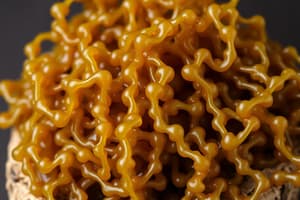Podcast
Questions and Answers
Immunology is the study of the immune system like the organs, cells, structure, function, response against antigens, and disorders.
Immunology is the study of the immune system like the organs, cells, structure, function, response against antigens, and disorders.
True (A)
The immune system functions to give immunity against internal injuries in the body.
The immune system functions to give immunity against internal injuries in the body.
False (B)
The first line of defense against microorganisms is the immune system's adaptive response.
The first line of defense against microorganisms is the immune system's adaptive response.
False (B)
The second line of defense provided by the immune system is highly specific.
The second line of defense provided by the immune system is highly specific.
The adaptive immune system can provide highly specific protection against invaders.
The adaptive immune system can provide highly specific protection against invaders.
Innate immunity is one of the types of immunity against infectious diseases.
Innate immunity is one of the types of immunity against infectious diseases.
Adaptive immunity relies on mechanisms that exist before infection.
Adaptive immunity relies on mechanisms that exist before infection.
Innate immunity responds more slowly than adaptive immunity.
Innate immunity responds more slowly than adaptive immunity.
Natural killer cells are part of the humoral mechanisms in the immune system.
Natural killer cells are part of the humoral mechanisms in the immune system.
Tonsils and adenoids are organs of the immune system.
Tonsils and adenoids are organs of the immune system.
Acquired immunity is based on genetic make-up.
Acquired immunity is based on genetic make-up.
Interleukins are a group of signaling proteins made and released by host cells in response to the presence of several bacteria.
Interleukins are a group of signaling proteins made and released by host cells in response to the presence of several bacteria.




